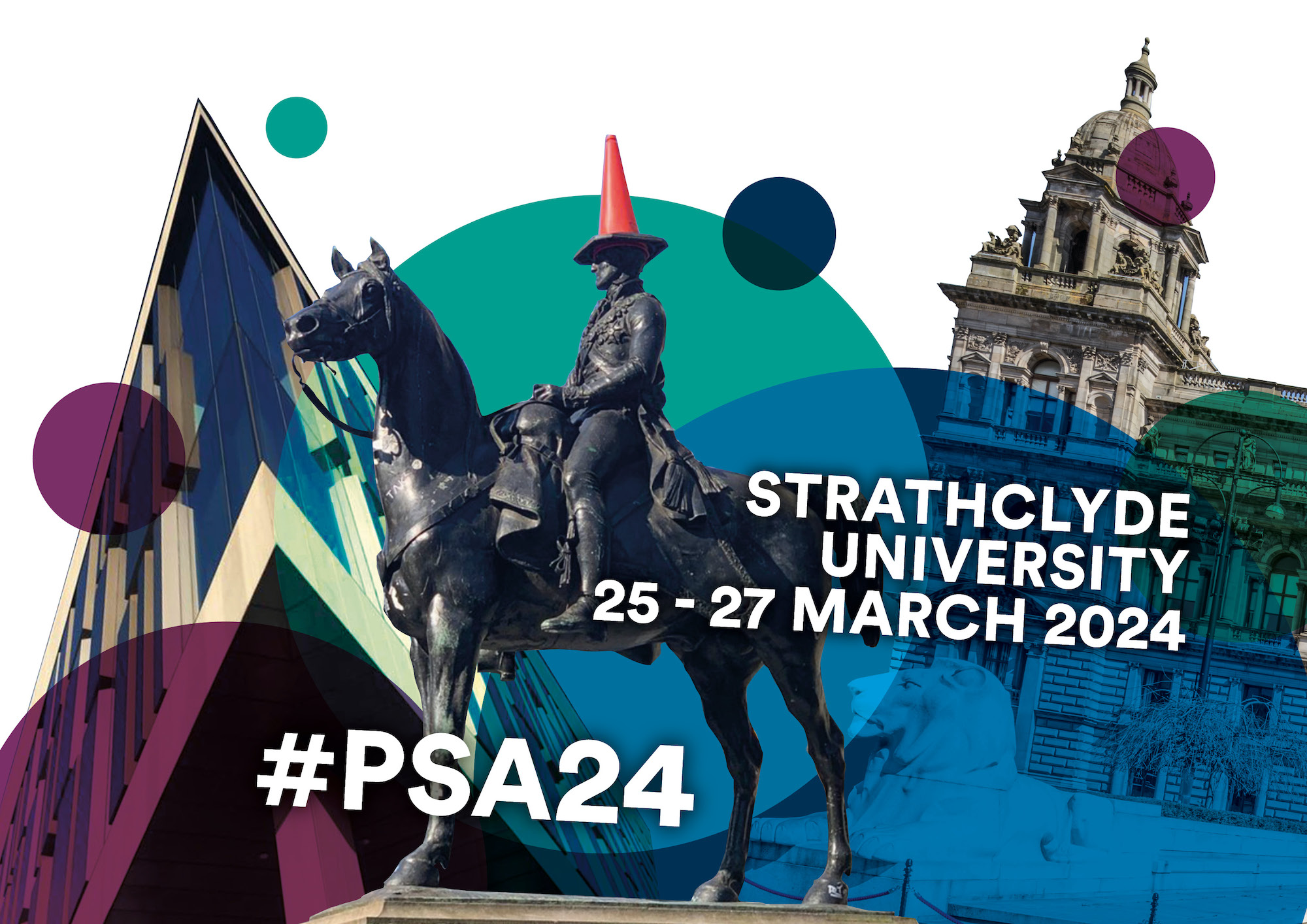Participatory and Deliberative Democracy Specialist Group Panels
By Will Smith
The Participatory and Deliberative Democracy specialist group hosted eight well-attended panels at PSA 2024. The discussions were of a uniformly high standard, with stimulating discussions across a range of issues. The presentations taken together show that interest in participatory practices and deliberative forums remain as high as ever, though the challenges of fostering participation and deliberation in conditions of resource scarcity, climate change, and the lingering influences of neoliberalism and populism remain profound.
The challenge of neoliberalism was a recurring theme across a number of our panels. The very first panel of the conference, on ‘participation, community, and neoliberalism’ (Mon 9.30-11.00), explored this challenge through a mixture of case studies and thematic analysis. Dr. Ruth Lightbody (Glasgow Caledonian) presented findings from her study on the role of playgroups in promoting participatory opportunities and community resilience in Scotland, while Dr. Stephen Williams (Birmingham) shared his research on democratic facilitation in healthcare settings. Dr. Markus Holdo (Lund), meanwhile, discussed themes that are explored in greater depth in his recently published book Participatory Spaces Under Urban Capitalism.
Several of the papers that addressed neoliberalism also illuminated various manifestations of democratic resistance to it, exemplified by the panel on ‘identities, materialities, and/as resistance to neoliberalism’ (Tue 9.30-11.00). Heini Salminen (Helsinki) spoke to the character and complexion of temporary queer spaces as sites of agency and resistance. Prof. Amanda Machin (Agder) and Prof. Moya Lloyd (Essex) presented papers that shared a focus on the ‘body’ as a site of resistance, focusing respectively on hunger strikes carried out by mothers and the performative dimensions of corporeal politics. Dr. Hans Asenbaum (Canberra) and Dr. Taina Meriluoto (Helsinki) rounded out this discussion through sharing their thematic research into radical pluralization and the mobilization of the multiple self.
The idea of resistance was also explored through a series of papers on the various ways in which activists and researchers are working to push at the boundaries of democratic innovations. The panel on ‘disrupting democratic innovations’ (Wed 9.30-11.00) included a paper by Dr. Temidayo Eseonu (Lancaster) exploring the scope for democratic innovations, specifically truth and reconciliation commissions, to function as decolonial praxis. Dr. Zohreh Khoban (Southampton) presented a set of reflections on how antisexist and antiracist political commitments can form the basis for a more authentic and sincere form of political participation. Dr. Rod Dacombe (King’s College London) presented findings from a series of studies that aimed to give citizens a greater role in shaping research into the cost-of-living crisis in the UK. And Domenico Andrea Schiuma (University of Genoa) offered a valuable, systematic overview of the recent literature on institutionalizing democratic innovations.
The picture that emerges across these panels is one that casts light on both the scale of the challenge posed by neoliberalism and the diversity of responses to it. The role of researchers was foregrounded in a fascinating series of inter-linked presentations on the panel ‘teaching students to imagine alternatives to neo-liberalism: introducing deliberative culture through practice in universities’ (Mon 3.30-5.00pm). Dr. Emilie Frenkiel (Paris-Est Créteil), Dr. Alice Moseley (Exeter), and Ms. Lucile Bouré (Paris-Est Créteil) shared their contrasting experiences of crafting undergraduate courses that require students to acquire first-hand experience of participating in a deliberative and participatory process as part of their assessment.
Another major theme that emerged throughout the conference was the strength and weaknesses of ‘mini-publics’ as means of realizing deliberative and participatory democracy. The panel ‘can climate change assemblies combat neoliberalism?’ (Mon 1.30-3.00pm) included three papers that tackled this theme. Michele Zadra (Southampton) offered a balanced appraisal of the scope for climate assemblies to provide an ‘escape-route’ from the democracy-decarbonization dilemma. Dr. Hannah Salamon (Glasgow) presented collaborative research on whether and how diversity and inclusion of witnesses in mini-publics affect citizens’ perception of their legitimacy. And Mrs. Maria Diaz (Edinburgh) presented research into citizen participation in Chilean local public security policies.
The panel on ‘citizens’ assemblies and the climate crisis’ (Tue 3.30-5.00pm) offered further reflections on the role of mini-publics. Ms. Claire Mellier (Iswe Foundation) offered a valuable practitioner perspective, in her paper on whether citizens assemblies can help to navigate the systemic transformations required by the climate crisis. Prof. William Smith (CUHK) offered a critical analysis on the pitfalls of attempting to ‘scale-up’ citizens’ assemblies to transnational and global levels. And Roberto Cruz Romero (Leipzig) argued that ‘radical transparency’ is a crucial ethos for facilitating citizen participation and democratic innovation. A take-away from these panels is that, while interest in mini-publics remains a notable feature of our field, there is considerable awareness of their limits as participatory and deliberative mechanisms.
The conference also saw a range of papers that explored themes on the cutting-edge of research into participatory and deliberative democracy, including a panel on ‘digital technologies and democratic innovations’ (Tue 1.30-3.00pm). Dr. Daniel Berliner (LSE) presented findings from a study on information processing in participatory governance, while Ms. Mariam Cook (Exeter) explored whether advances in information modelling can support further innovation in participatory politics. And Mr. Scott Downham (King’s College London) offered findings from a study into the ways in which young people often resist being socialized into filter bubbles and echo chambers online.
The conference drew to a close with our final panel, which focused on ‘participatory forums and political elites’ (Wed 3.30-5.00pm). Emma Lancha Hernández (IESA-CSIC) presented work on political elites and citizen participation and José Luis Fernández Martínez (IESA-CSIC) offered findings from an elite survey into the impact of different goals on the design of participatory forums. Rodrigo Ramis-Moyano (IESA-CSIC) explored the issue of how politicians want their citizens to deliberate and Andri Heimann (Zurich) shared research on elite perspectives of mini-publics in Switzerland.
Thanks to all our presenters for a highly stimulating set of panels and papers!

